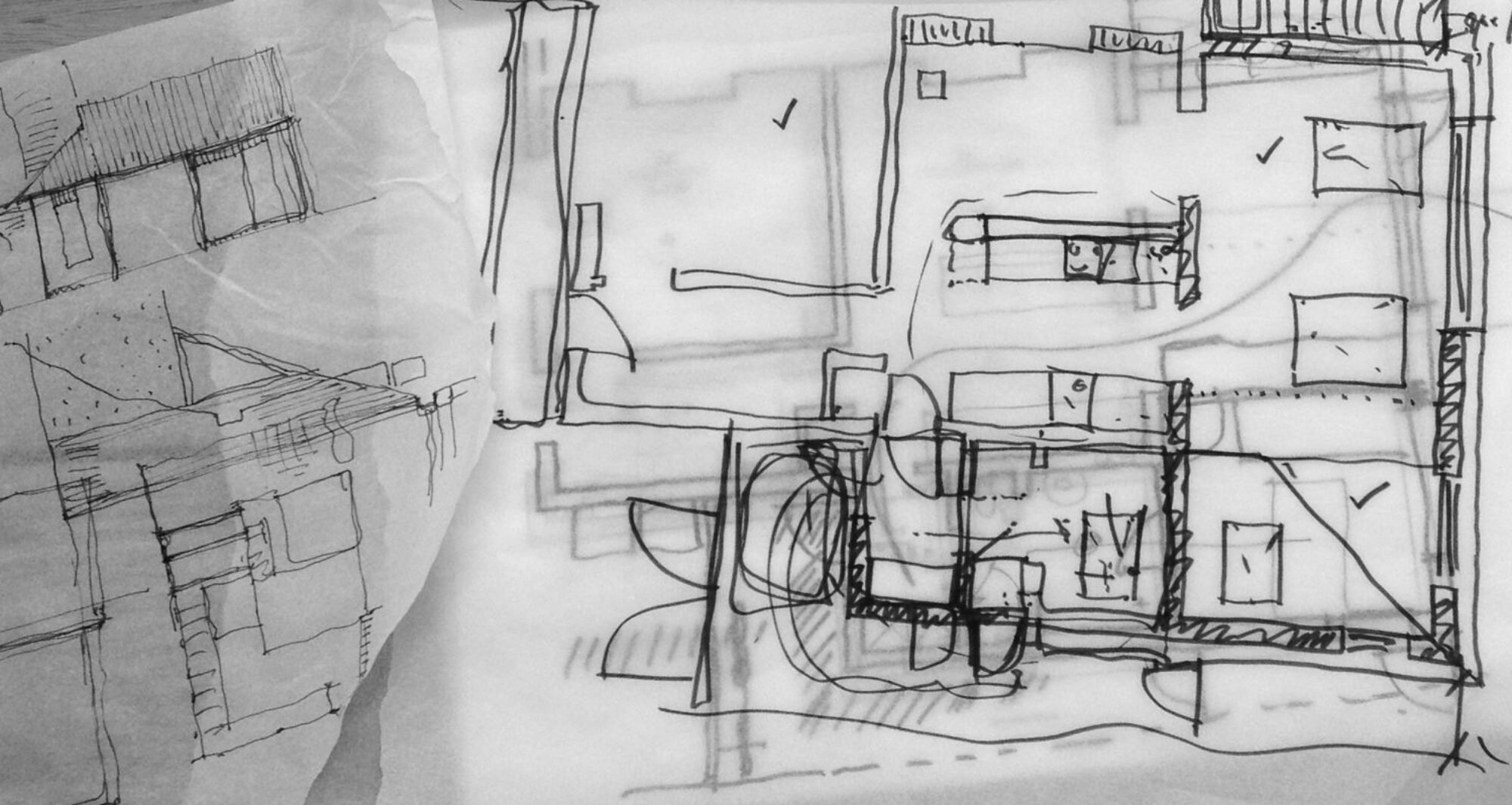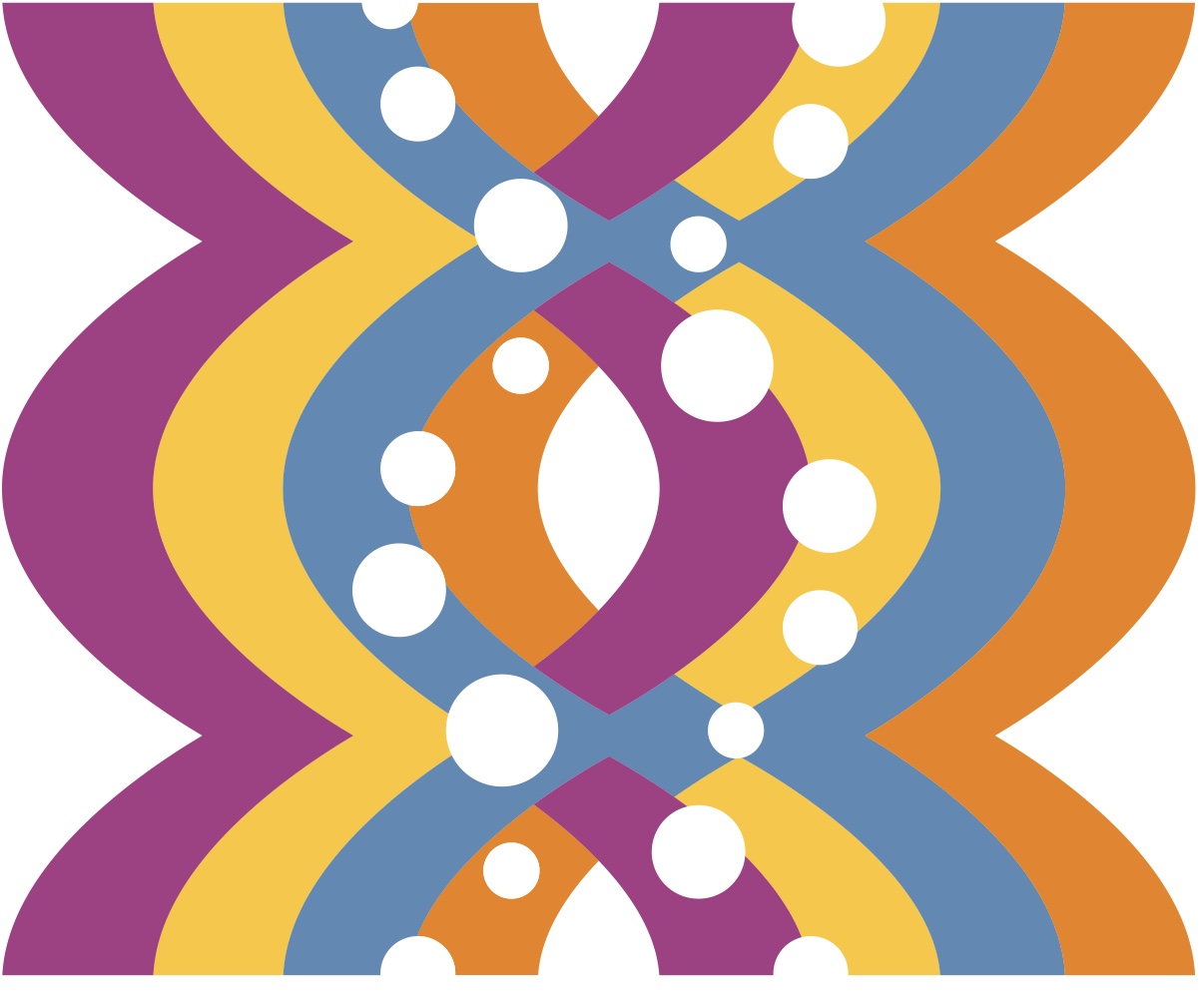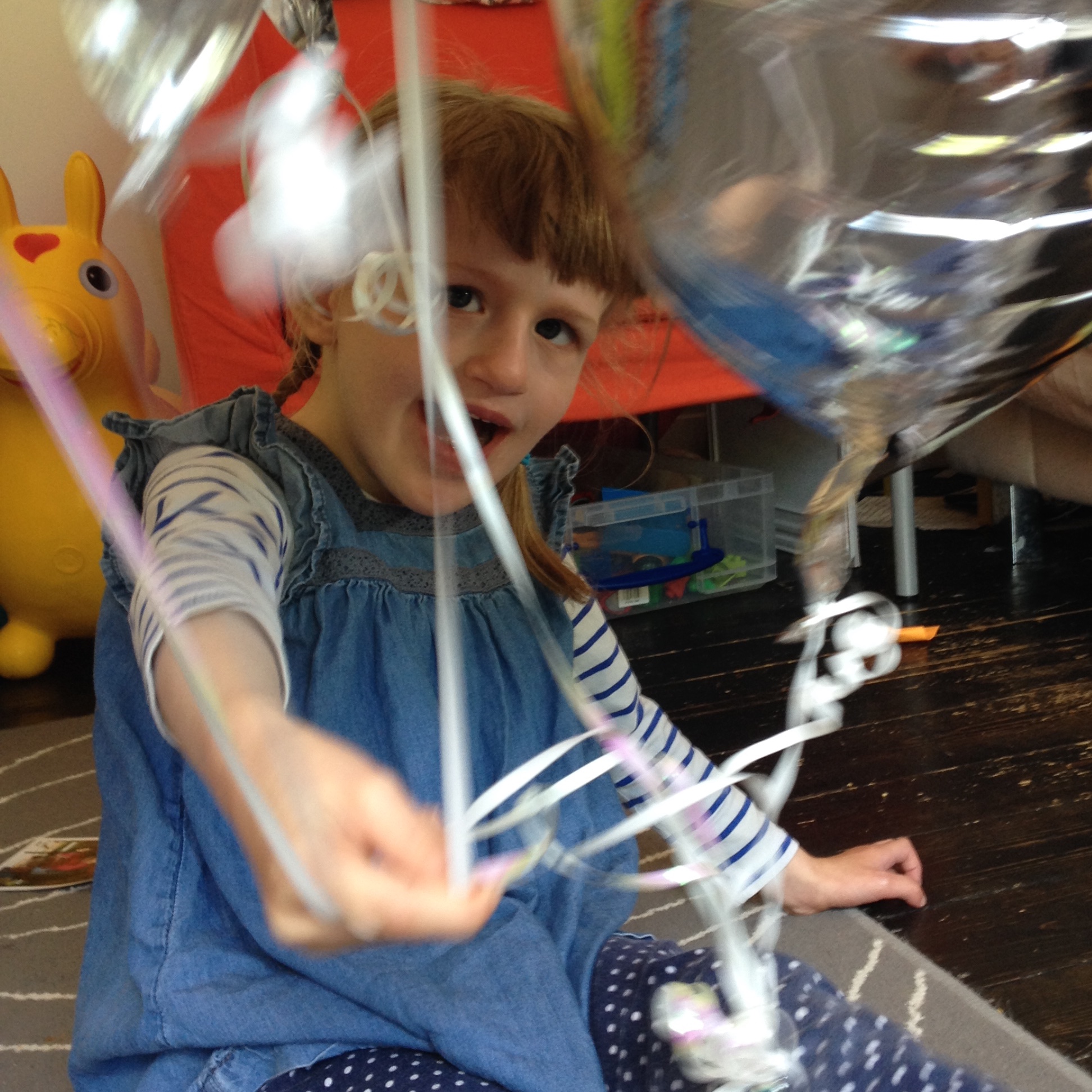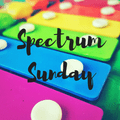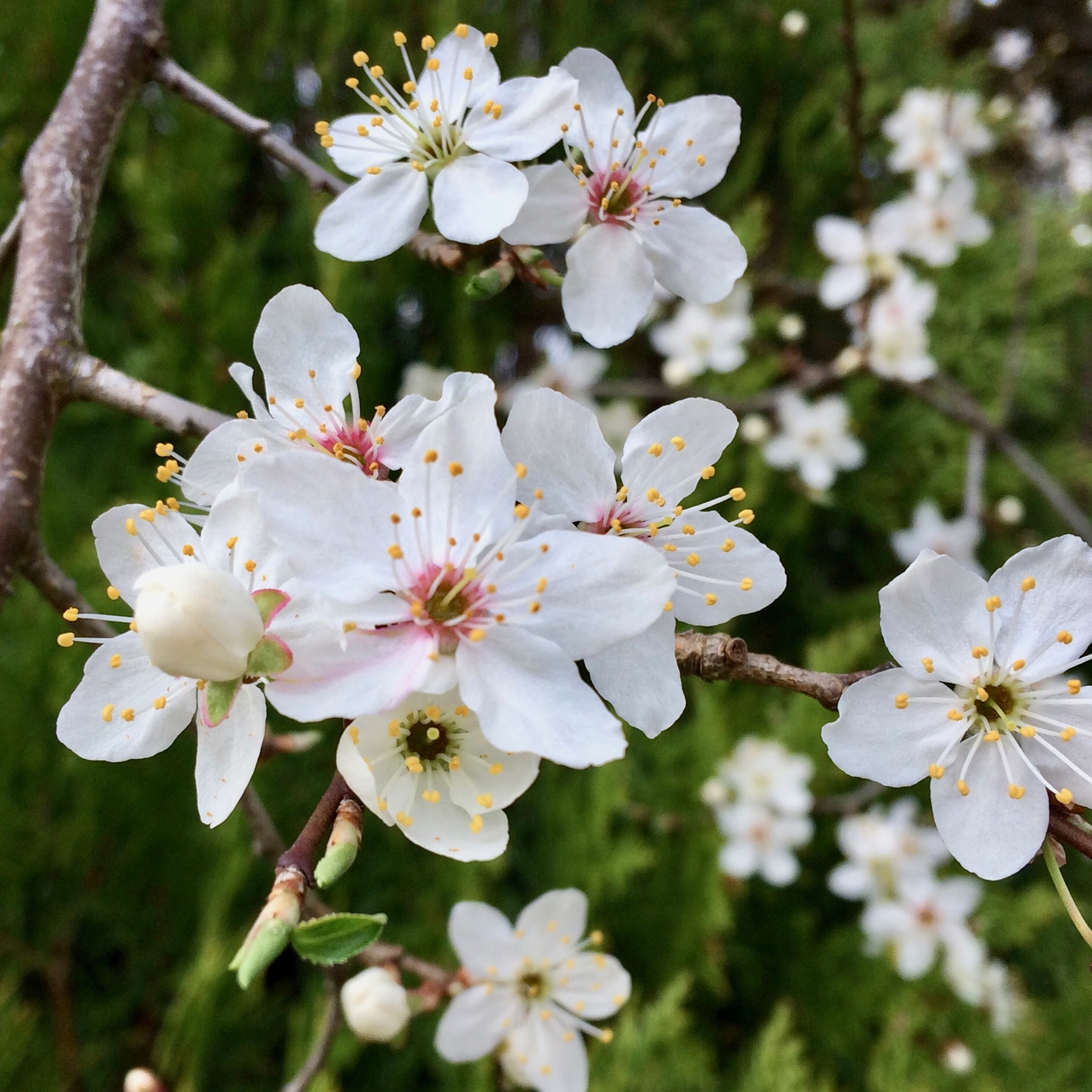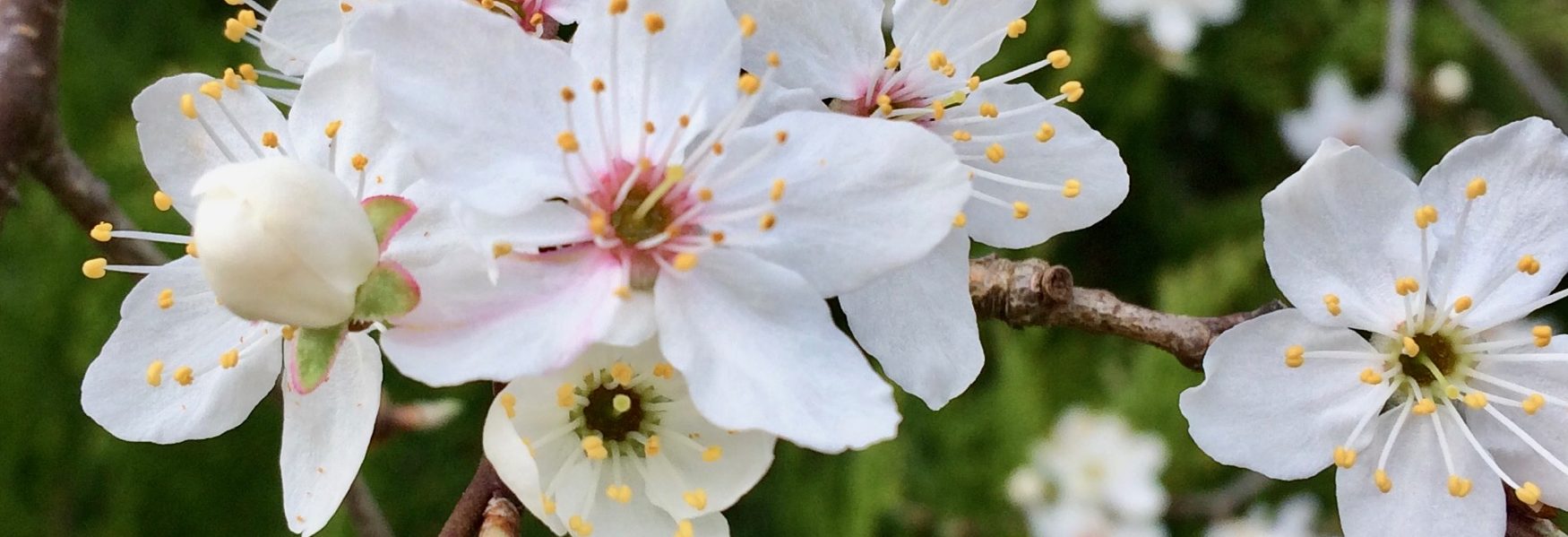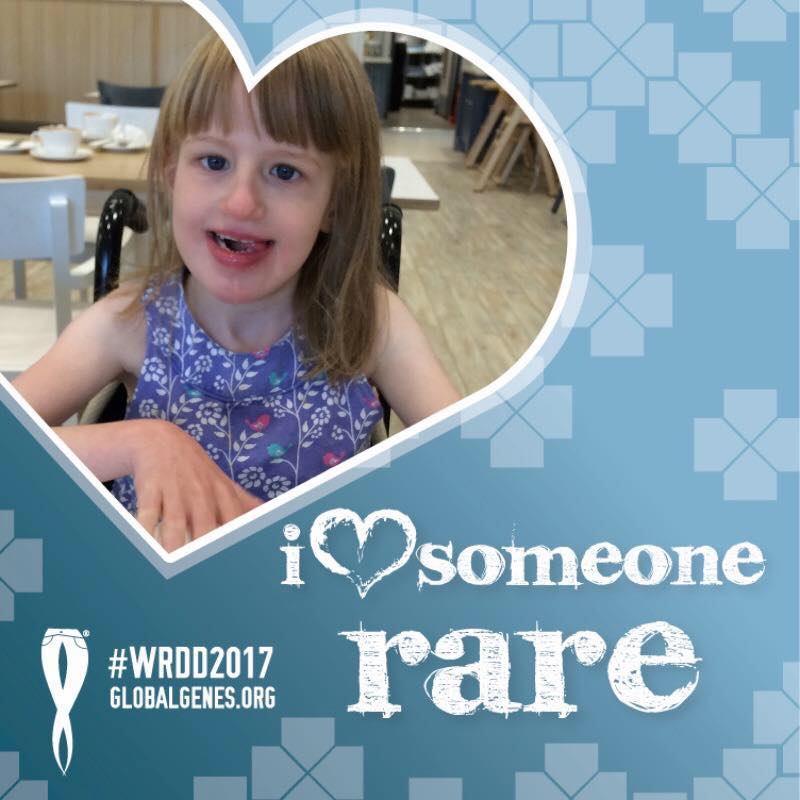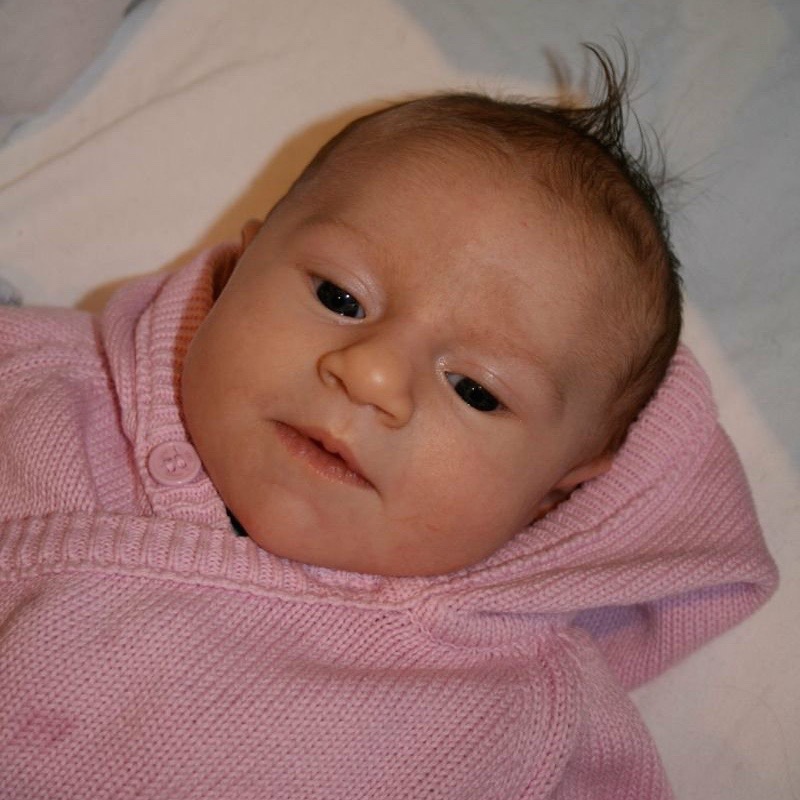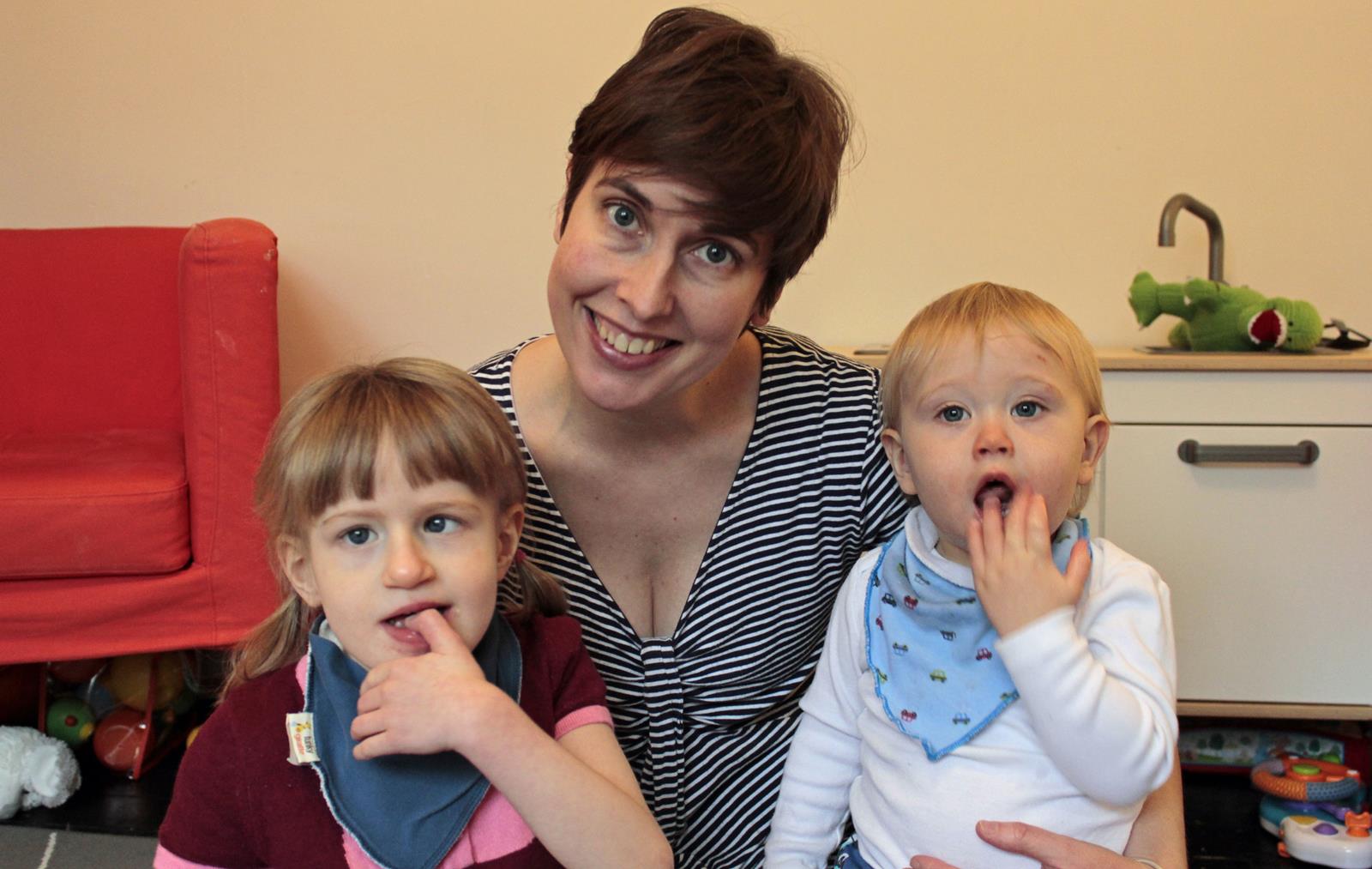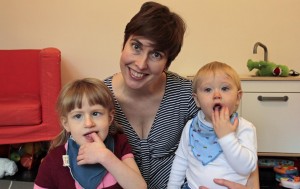SWAN UK is so much more than just a chat forum!
A post for Undiagnosed Children’s Day 2017
When J was born 6 years ago, our blissful newborn baby bubble was burst in a matter of days, by an echocardiogram, a skull x-ray and some chromosome blood tests before we even left the hospital. This was the beginning of a very confusing time and a long list of hospital appointments and tests, over many months and years, as each came back ‘in the normal range’, ‘clear’ or ‘negative’.
J’s main ‘symptoms’ (impossible to see in antenatal scans or in a newborn baby) are developmental and sensory disabilites, which gradually became more and more apparent as she grew older, but, especially as J was our first child, it was hard to tell if early symptoms (reflux, low muscle tone, heart murmur etc), were anything to be concerned about. As the tests seemed to say otherwise, we often felt like neurotic first time parents and, living in limbo, without a diagnosis felt very isolating. You can read a little bit more about that time in my post Monkeys & Swans
We felt like the only people in this position, and didn’t really feel like we fitted in regular parenting groups, but without a name for J’s condition, I didn’t know where to look for somewhere we would feel we belonged. If only I’d thought to google ‘Syndrome’s Without A Name’ or ‘Undiagnosed’ earlier in our journey as SWAN UK (Syndrome’s Without A Name), the only dedicated support network available in the UK for families of children with undiagnosed genetic conditions, was there all along!
We found SWAN UK just over 4 years ago, when J was a little over 2 years old and I can’t really explain how much of relief it was to find we were not alone. That there were people who ‘got it’. And that there were people we could turn to for advice and support. It truly was a lifeline of sorts.
I know Facebook has a bit of a bad press sometimes, and it can be a bit, ‘look at me and my perfect life‘, but it does also provide those who, for whatever reason, struggle to connect with others in real life a fantastic and easy to access medium to make those connections further afield.
SWAN was not my first dabble into support goups and internet forums. Before J and W came along, my husband and I went through an emotional few years of recurrent miscarriage and I found refuge in an amazing bunch of women in a miscarriage support forum on Babycentre website. Many of us have met up in real life and are still in touch now via Facebook. I guess it’s a similar scenario in that, although miscarriage is extremely common, people don’t really talk about it and you can feel so alone.
But what I also want to highlight today is that SWAN UK is not just another forum. Not just a webpage or a just a Facebook page. It’s all of those things, plus there’s so much more going on behind the scenes that help to support families like ours!
The main aims of SWAN UK are:
Develop and support a community of families of children affected by undiagnosed genetic conditions.
Support the development of high quality information and services for families of children affected by undiagnosed genetic conditions.
Raise public and professional awareness of undiagnosed genetic conditions and the unique challenges faced by affected families.
So what this looks like to me (and this is just me as a parent member, I know there’s lots more I don’t know!) is:
An amazingly supportive facebook group/forum with families from all across the UK! The group is really warm and friendly, and as it’s moderated by SWAN, and a host of volunteer parent reps, it’s not a group that suffers from confrontation or competitive parenting (like some other groups I’ve joined in the past and pretty quickly left again!). There’s usually someone around 24/7, so there’s pretty much always a listening ear. It’s a great place to come for advice, support and gentle ‘cyber’ hugs when you need them, as well as an place with encyclopaedic knowledge for asking totally practical advice such as types of equipment, filling out forms! There are also separate smaller regional groups, so people closer together can arrange informal meet ups and chat about specific issues in their areas. As well as allowing you to break the geographical barriers, another benefit of being online is that you can get involved as much, or as little, as you like, and are perhaps are more comfortable to speak openly with in a ‘virtual’ community than you’d be in real life. The groups are all ‘secret’ so membership cannot be searched for by anyone not in the group either, so you have anonymity if you want or need it.
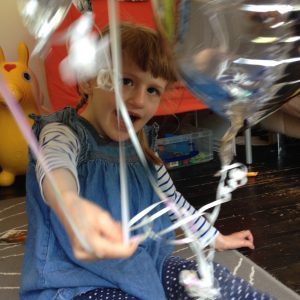 In addition to the forums, SWAN also organise and fund lots of family get togethers throughout the country! We’ve been to the zoo, a maize maze, to a soft play party and on a train ride over the time we’ve been members! I’ve loved meeting some of the other localish families in real life, lovely to meet the children, and them to meet each other, and I think as W grows older, meeting the siblings of other undiagnosed children will also become really important for him.
In addition to the forums, SWAN also organise and fund lots of family get togethers throughout the country! We’ve been to the zoo, a maize maze, to a soft play party and on a train ride over the time we’ve been members! I’ve loved meeting some of the other localish families in real life, lovely to meet the children, and them to meet each other, and I think as W grows older, meeting the siblings of other undiagnosed children will also become really important for him.
Balloons! This may sound a bit superficial, but I can’t tell you how lovely it is to receive a lovely gift of balloons, knowing our SWAN family is thinking of us and providing lots of fun! Who doesn’t love a balloon!? SWAN try to send balloons out to children in hospital, going through a particularly rough time and occasionally randomly just to make a child smile! As you can see in the picture, the balloons we received went down very well!
SWAN UK do a lot of work with professionals too, to raise awareness within the disciplines that families will come into contact with on their childhood journey, from Midwives and Health Visitors to GPs and NHS decision makers about the added complexities families face without a diagnosis, and pressing for better co-ordinateion of health care and social care. Some key successes they’ve been integral in, in this area are the appointment of a specialist undiagnosed nurse specialist at Great Ormond Street and a specialist Rare Disease unit at Birmingham Children’s Hospital!
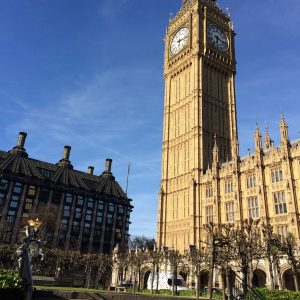 SWAN UK, and their parent organisation Genetic Alliance, are also working with the government on policy around research, resources, services, treatment etc of rare genetic and undiagnosed conditions. Genetics is such a new and fast moving science there’s so much happening that could make such a difference! I got to see a little bit of this work first hand last year, when SWAN UK parent reps and bloggers were invited to attend the first report of a new APPG (All Party Parliamentary Group)! So amazing to see Genetic Alliance and SWAN influencing at all levels to help improve services for our families and really interesting to see parliament at work too!
SWAN UK, and their parent organisation Genetic Alliance, are also working with the government on policy around research, resources, services, treatment etc of rare genetic and undiagnosed conditions. Genetics is such a new and fast moving science there’s so much happening that could make such a difference! I got to see a little bit of this work first hand last year, when SWAN UK parent reps and bloggers were invited to attend the first report of a new APPG (All Party Parliamentary Group)! So amazing to see Genetic Alliance and SWAN influencing at all levels to help improve services for our families and really interesting to see parliament at work too!
So the reason I’m writing this today is it’s Undiagnosed Children’s Day! A day to make a group effort to let the world know about the work SWAN UK do! They already support 2000 families of children with undiagnosed conditions but, as 6000 children are born every year with no diagnosis, there are many more they could be supporting!
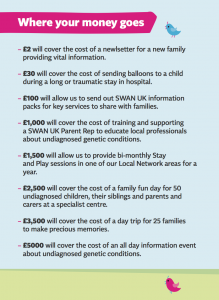 SWAN UK are asking us to be detectives today and help find those families (like ours) who could benefit! Help us spread the word!
SWAN UK are asking us to be detectives today and help find those families (like ours) who could benefit! Help us spread the word!
If you know someone you think might benefit from joining the swan community please do pass this on, and if you have a child with an undiagnosed condition please do join the community! It may sound overly gushy, but SWAN UK really is like a big friendly (and non-judgemental!) family and I don’t know where we’d be without their support! You can sit in the background quietly, or get stuck into chat in the forum, either way SWAN is there to support you and they are out their advocating for all of us!
SWAN UK relies on grant funding and donations and this list shows where some of this money is needed. If you can please help them keep up the great work for families like ours!
Find SWAN at:
Website: www.undiagnosed.org.uk
Email: info@undiagnosed.org.uk
Facebook: @SWANchildrenUK
Twitter: @SWAN_UK
Instagram: SWANchildrenUK
Mother’s Day Interview
On the run up to Mother’s Day, the fab Mum on a Mission has organised an interview exchange among a group of fellow SEND bloggers!
So, I would love to give a warm welcome to Beth of Little Lydia, whose interview is posted below…..
Introduce yourself
Hi I’m Beth, I’m the wife of David. I’m also the mother of 2 crazy girls.
My eldest (I’m not allowed to call little any more) is called Caitlin, she’s 8 and is AWESOME! She is into anything and everything. Last weeks favorites were trampolining, painting and coding games. This week its Lego and crochet (did I mention it’s only Monday).
My youngest is little Lydia, she’s now 16 months but I think this is forever going to be her name. Lydia was born with a condition called Dandy Walker syndrome, apparently its extremely rare.
A couple of Neurosurgeons from Cardiff felt that they could play God with Lydia’s life and she had surgery at 10 days old, as a result she developed meningitis and sepsis. This then led to hydrocephalus which couldn’t be managed for months. She was airlifted to Liverpool after making the front page of our local newspaper to have corrective life saving surgery and in one operation had a huge cardiac arrest which in turn has caused significant cerebral palsy. We have since been told the first operation was probably not the right thing for her.
This last 16 months has been a complete whirlwind of highs and lows, life and nearly death. HOWEVER Lydia is at home as I type this she is grunting at her Dad because he’s watching football and he has ignored her for more than a few minutes – how rude! She’s definitely communicating and is full of life. We LOVE having her home and being together. She’s our miracle, a gift from God and we wouldn’t have her any other way (apart from being free of all the medical issues).
What piece of advice would you give to another Mum in the same circumstances as you?
If I had to give one piece of advice it would be to never give up, don’t let anyone feel that they know your child better than you. If anyone wants to do tests in any shape or form don’t be afraid to ask what they are doing and for what reason. You are your child’s biggest and only advocate. No one will stand up for them like you and if you know something isn’t right don’t ever feel like you are being bossy or an inconvenience.
Doctors and nurses have a duty of care but that doesn’t mean they DO CARE for your child. I’m not being disrespectful but for so long I was made to feel that because Lydia had complex needs and they were experts in their field that they knew what was best for her when in fact they didn’t, I did.
It took me a long time to get my head around all the medical terms, it felt really intimidating and isolating. I read loads especially about Dandy walker syndrome, I still read loads but I also know Lydia really well now. I know her patterns and behaviors and when we go into hospital its me giving instruction about what I think is wrong.
If you aren’t being listened to ask for a second opinion. It is illegal to refuse a second or a thousandth opinion.
What’s the best piece of advice another Mum has given you?
The best piece of advice another mum has given to me, has to be from a good friend of mine. She is an amazing mother. Her kids are some of the kindest and best behaved children I’ve met and she has 5 of them! She said never be afraid of saying no, either to your children or other parents or even grandparents. Providing its done out of love and for the best reasons. If you think something isn’t right for your child say no and stick to it. Also don’t be afraid of what others think if you do say no, they are your children.
I saw her saying no to one of her children once. I cant even remember what it was over but she said it very calmly but directly. He shrugged and walked off. NO FUSS… NO TANTRUM!!! I was like…. How did you get him to do that…? Gob-smacked! She replied so calmly and graciously – he knows when I say no, I stick to it. Fair enough it works, it took some doing and sticking by. Accompanied by a ton of guilt and crocodile tears. It’s not always a tantrum free zone because, lets face it kids are kids. But Caitlin now accepts (generally tantrum free) if we say no its no, regardless of who is present. #winning!
What one thing did your mum always used to say to you which you have found yourself repeating since becoming a Mum?
My mum always used to say and still does, just take one day at a time. I say this A LOT now.
Who would play you in a movie of your life?
I would love to say Rachel McAdams, I love her.
What are your plans for Mother’s Day this year?
My plans and prayers for mothers day this year are to be hospital free and the whole family to be in good health. Anything outside of that is a huge blessing to us.
If you could go back to the beginning, what would you tell yourself as a new Mum or as a Mum of a newly diagnosed child?
If I could go back to the beginning of my journey as a mum, I would tell myself to stop worrying so much on what others think about anything. That their opinion doesn’t count for anything.
I would tell myself to give me a break, it’s ok to have a nap and not be dressed and made up all day every day, its ok for the kids not to have a room FULL of toys and stuff because all they want is time. Precious time.
I would tell myself that a fancy house, a fancy job and fancy clothes don’t count for anything when your child’s health is at risk. Enjoy the little things.
What is the biggest battle you’ve faced as a Mum?
The biggest battle I’ve faced as a mother is getting others to listen and respect my daughter Lydia.
She is a person not a neurological condition. Not a mistake. Not a regret. She’s a person in her own right, with her own mind and her own personality which we are to respect and accept.
zzI have had to see her on life support more times than one should. I’ve also seen her have a cardiac arrest, which no mother should ever have to witness. She has been through way more than the average child or human has ever been through and she deserves the right to be acknowledged, appreciated and loved as Lydia. Perfect the way she is.
If you were PM for the day what would you change to make life easier for Mums of disabled children?
If I was PM for the day, I would scrap the age limit on DLA mobility. You either need a car for mobility purposes or you don’t. There shouldn’t be an age limit.
We currently don’t own a car, we have to borrow my parents to get back and forth to appointments, which is at least three times a week. I have to push Lydia to the car, take her out of her wheelchair still attached to oxygen wires on the wheelchair and a feeding pump, again wires attached to her face that lead into a bag that feeds her. Then position her properly – she cant support her head properly by herself yet. Then take the suction machine from the wheelchair and place it into the car followed by her feeding backpack and oxygen backpack. Clip her in her seat, before taking the wheelchair to the back of the car and having a full on fight to take it into 3 parts which is not only complicated but extremely heavy, especially in the pouring rain! After all that I then have the delight of a free but frequent game of tetris to fit it in the boot in a certain order or the boot wont close. All because Lydia is small enough to carry without needing mobility!
I would also like to see changing places pretty much every where!
I would make it legal for specialist doctors and consultants to perform surgeries on children privately in the UK without all the red tape. Some children need expertise from world specialized consultants but are too poorly or vulnerable to travel to the needed care. Therefore provided said consultant has all the right certification and the parents were willing to pay privately then that consultant should be able to perform or treat the child as needed within the UK.
What’s the best thing about being a Mum?
The best thing about being a mum is witnessing all the firsts.
The first bath, the first time leaving hospital, the first smile.
Caitlin’s 8 now and it still doesn’t get old. She managed to skate the length of our garden all by herself a few weeks ago. It was amazing, she was so chuffed with herself and I was so happy that we stuck it out with her.
It really is a great day whenever one of the girls get a first. It makes all the hard work worth it by a million times.
Funniest moment as a mum?
My funniest moment as a mum… that is impossible to say I live with a comedian of a husband and the kids follow suit. They are very much Daddy’s girls. Caitlin has great one liners, which are hilarious. Even listening to her laughing makes me howl with laughter. Lydia pulls the funniest of faces and pretends to sleep if she doesn’t want to partake in conversation with you. A particularly funny time was at Christmas when I let Caitlin decorate the tree and found Lydia covered in silver tinsel and a big bow on her head happy as Larry!
Who are your favourite Mum bloggers?
I don’t have a particular favorite mummy blogger. I read a range of blogs depending on my mood and where the kids are at.
I do have a keen interest in reading blogs about accessible places and what works for both of my girls.
Also if I’m struggling with a particular thing I might go to pinterest and see what other mums have to say about it. I find that others mums and their experiences (especially medical ones) have a much deeper understanding and better handle on giving great advise compared to a person in a paid role with no real hands on experience.
What is your life motto?
“The Lord is in control. This is exactly where he wants me to be right now”
Finally, if you won the lottery today, what’s the first think you would buy?
I would buy a car and adaptations for my home.
After that I would spend the rest of the money on research into a cure for Hydrocephalus. It’s a very complex condition with no research in the UK. 400,000 neurosurgeries a year are for shunts to manage hydrocephalus. Shunts only have a 50% success rate and many people have to keep having repeat neurosurgery because there is currently no cure.
I would like to change that, not just for Lydia but for all people.
You can find Beth’s blog, and follow her on social media, here:
Blog URL: www.littlelydiablog.wordpress.com
Facebook: littlelydia.co.uk
Instagram: Bethsworld101
Pinterest: bethsworld101
Rare but not alone
We are members of SWAN UK, a fantastic support network for families of children without an overarching diagnosis for their medical conditions and/or disabilities, support for families of those with a Syndrome Without A Name.
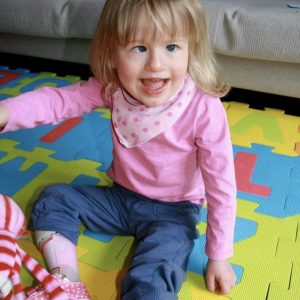
We didn’t find SWAN (run by the charity Genetic Alliance) until EJ was 2 years old, when we found a leaflet in our enrolment pack for the DDD study. Until this point all the standard NHS genetic tests available had drawn a blank in identifying any particular reason for her developmental delays and we had felt pretty confused and alone. (You can read a bit more about this uncertain time here and here.)
The DDD (Deciphering Developmental Disorders) study is a far more detailed method for genetic testing than the NHS can offer (which coincidentally is being carried out just down the road from us at the Sanger Institute in Cambridge!), using new technologies to try to identify particular gene changes responsible for developmental disorders.
“Instead of having a targeted test for a particular change, we therefore have to look across all of the child’s genome to find out if and where a change occurred which caused the disorder” – www.ddduk.org
This analysis of the whole genome can take some time…..
…. and in the meantime we have become quite comfortable being part of our big ‘SWAN’ family. We’ve found help, advice, comfort, true friends and love in our extremely diverse community, and have celebrated Undiagnosed Children’s Day at the end of April each of the 4 years since we joined.
However this year is a little different.
And I’m actually writing this particular post to coincide with another awareness day, Rare Disease Day, because (quite out of the blue as we’d almost given up hearing anything at all!) we received a letter via EJ’s geniticist that the DDD study has found a gene change that is the probable cause of EJ’s disabilities! So, quite unexpectedly EJ may have become a ‘graduate’ SWAN (although I am relieved to say that graduate SWAN families are most welcome to remain part of the big SWAN family – phew!)!
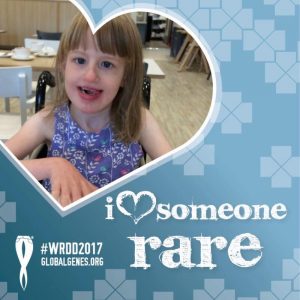 Of course you are always advised to steer clear of Dr Google, but when it’s been 5 years since investigations began, you kind of can’t not google!? And also, when you are dealing with something so rare, and so new, there’s almost as much information out there in the hands of Dr Google as there is available to the medical professionals (granted I’m not quite as qualified to interpret it all as the real doctors!)!
Of course you are always advised to steer clear of Dr Google, but when it’s been 5 years since investigations began, you kind of can’t not google!? And also, when you are dealing with something so rare, and so new, there’s almost as much information out there in the hands of Dr Google as there is available to the medical professionals (granted I’m not quite as qualified to interpret it all as the real doctors!)!
I’m not sure if there is a right way to give a family a diagnosis, especially such a long awaited one. I’m not even sure if this counts as a diagnosis as such? Too fledgling a discovery even to have a name, other than the gene name, KAT6A. We were told via letter, which may sound a bit blunt to some, but I think I would have worried myself silly having received a more cryptic letter asking us to attend an appointment at a later date, or a telephone call, which always seem to come at an awkward time.
I think it probably depends on the news.
The information we were given was not frightening to us. Internet searches of EJ’s gene glitch brings up almost an exact list of the symptoms we already knew about for her. I think if there had been more worrying symptoms listed I might feel differently, and perhaps the news would have been delivered differently?
After Dr Google, our next move was to check Facebook to see if there were any other families out there, and, lo and behold! There are! So far, around 70 (mostly children) all across the world, including a few others in the UK, who have disabilities almost exactly like EJ! Some of the families have even gathered together the information known about the KAT6A gene change on this new website!
I’m not yet sure how much difference having this information will make. In some ways a relief? We may learn some useful things through research into the gene change… issues around health? Perhaps improved strategies to help EJ reach her potential?
However the loveliest thing about the diagnosis so far is finding those other families, and also discovering some of the ‘behavioural traits’ linked to the condition are ones that we know & love!….
A happy demeanour! Always smiling, loving cuddles, giggling and laughing often!
And so it seems we are embarking on another stage of our journey….. but always thankful to have our SWAN family travelling with us!
slipping through the cracks
A post for Undiagnosed Children’s Day, 29th April 2016….
The very nature of an undiagnosed condition (a Syndrome Without A Name) is that it is not the same as any other that’s been identified.
Of course, every single one of us is different (whether deemed to have any physical or mental health condition, disability or not). And people who are diagnosed with a syndrome can be affected by it in very different ways (in the case of rare disease there may be very little known about the condition at all!), so diagnosis rarely gives a full picture.
And perhaps there are disadvantages to being ‘labelled’? Largely around preconceptions and conclusions that are leapt to about how YOU may be affected – when in reality there’s likely to be a huge variation from person to person.
However there are advantages in diagnosis too, which I’d say outweigh the disadvantages no matter how rare the condition, not least because it can help to stop you slipping through the cracks.
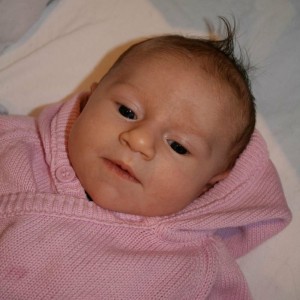 My antenatal tests gave no indications that EJ would be anything other than ‘a normal healthy baby girl’ – a commonly used phrase, and one that pregnant women are so eager to hear.
My antenatal tests gave no indications that EJ would be anything other than ‘a normal healthy baby girl’ – a commonly used phrase, and one that pregnant women are so eager to hear.
In the past perhaps I hadn’t really considered the implications of the phrase, how it separates ‘normal’ from, from what? abnormal? different? unique?!
As a phrase it now it tends to make me wince, because….
What is ‘normal’?
Indeed, what is ‘healthy’!?
When EJ was born, a few ‘issues’ rang some bells with the neonatal paediatrician and he ordered chromosomal blood tests while we were on the maternity ward. These came back ‘within the normal range’ so we were sent home reassured there was nothing ‘wrong’ with our new little baby bundle.
I can totally see how at this stage, with no evidence to suggest EJ wasn’t going to follow the typical child development path, it wouldn’t necessarily have been appropriate (or indeed helpful!) to launch into the full complexity of genetics and confuse a couple of tired and anxious new parents. However there was obviously in inkling there…..
…..and very gradually EJ began to collect more symptoms, including missing most of the typical development milestones, and her differences became more & more noticeable the older she got, and she began to stand out from the baby crowd.
The added complexity for us was that we moved NHS trust when EJ was 6 months old, so we had to start afresh with a new set of health professionals. Our GP notes of course would follow, but not instantly, and apparently notes and test results from hospitals don’t, they have to be requested specifically!
Thankfully we found our new GP surgery to be fantastically supportive and EJ was referred to our new hospital without fuss.
We then embarked on a very confusing journey of test after test, normal results, clear scans and more normal results. Being passed from one department to another, in and out of hospital clinics and community services.
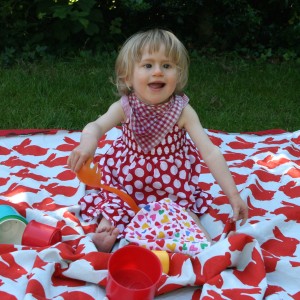
EJs symptoms (even her heart defect) could be related to ‘normal’ paediatric issues, so rather than being joined up, as they would more likely have been had she been diagnosed, were left feeling confused, even neurotic and paranoid about reading too much into things. We didn’t really know what questions to ask or even who to ask…..
We were also left feeling guilty and worried that perhaps we had done something wrong? Being asked by every new clinic the same questions about her history, even going over and over how my pregnancy had gone – did I drink or smoke or take drugs in pregnancy? – is all pretty guilt inducing! We’ve even been asked several times if me and her dad are related! – I know these questions have to be asked, but perhaps once is enough….? Perhaps a clear crib sheet at the front of medical notes!?
And all the while (we had a lot to take in, so unless things were spelled out it may have washed over us!) I don’t remember anybody saying (given her symptoms) that it was pretty likely that EJ did have some form genetic disorder no matter what the results of the tests. In fact I’m not even sure how many of the non medical professionals involved were aware that living with an undiagnosed condition is such a common state of being, sometimes not just a stage while you wait for meaningful test results (6000 children a year are born with an undiagnosed condition!)….I’d even hazard a guess that some may have suspected it was all in our minds…. as they (like us!), would have expected something to have come up in some of the tests EJ’d had.
The health, social care and early years education system can be complicated and confusing enough for anyone, but I think where having a child with an undiagnosed condition differs from those with known syndromes, even rare ones, is that without a ‘name’ you feel like you are constantly trying to convince people that there really is ‘a thing’. Whether that’s a thing (as for EJ) affecting her sensory processing and in turn her development, or a thing linking a group of medical problems together. Many, like us, feel isolated, perhaps not feeling like you qualify to join ‘additional’ needs groups (but can’t relate properly with mainstream), don’t qualify for help, and that perhaps you are a fraud for taking up valuable NHS time?!
Many undiagnosed children have extremely complex medical needs, many from birth or even before they were born, so unlike EJ will have been ‘in the system’ from the beginning – but, from what I understand, this doesn’t necessarily mean care is better co-ordinated. For many, one medical symptom will dominate, and that medical specialty might take the lead in fire-fighting that need, but they are not necessarily the right team to be investigating the cause and leading on the overall care of the child.
I really don’t mean any of this to sound critical of any of the individual people, teams or clinics involved, or indeed the NHS or social care. Far from it! Overall we have had wonderful care! We really do understand the massive strain and funding constraints on the NHS and social care, and the limitations of working within a framework of approved techniques, medications and therapies. However that’s not to say there couldn’t be big improvements in coordination of the care, particularly for patients with undiagnosed conditions. More coordination could also bring more efficiency (and less frustration!) for all involved, freeing up those in the caring and medical roles to ditch some of the admin and get on with what they want to do, providing support, treatment, therapy etc
With many known syndromes there are often typical symptoms and treatments, and you’d be put in touch with key teams, relevant tests carried out and early intervention therapies begun from the start with a coordinating specialist overseeing the care.
With a rare condition a plan is less likely to be in place, but at least there is a focus, something tangible even if still confusing. There is likely to be medical research going on, some interested specialists (which can never be the case for undiagnosed patients as they are all so different, we are all hanging around hoping to grasp at the coat tails of some identified condition).
Being diagnosed also gives you the opportunity to meet and engage with other families in a similar position, however few of them there are. It’s such a human need to be able to share experiences with others who understand – which is why SWAN UK is so important to us undiagnosed families, because although we are all so very different, we do share challenges and the confusion of the unknown.
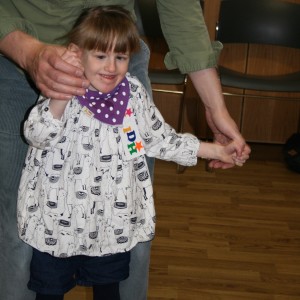
EJ’s long list of symptoms don’t really help give a full picture of her condition since they can be attributed to many other known syndromes and ‘normal childhood issues’ which means that we don’t know what the future might hold. In many ways I find this liberating, as there are no preconceptions about what her life and achievements will be. However it also raises difficult questions – Will she walk (what adaptations will we need to make in our home)? Will she talk (will we ever be able to communicate)? Will she be able to live independently (how much support or not will she need – what happens when me and her dad are gone!?)? Will she develop any associated health problems? Will she have a shorter life expectancy (actually I don’t think I want to know the answer to this last question!)!!!?
Genetics is just so bloomin’ complicated! We’re just at the tip of the iceberg in this area of medical research and, in the meantime, a long way to go to make sure it is acknowledged across the board that even if the tests don’t find an answer, it doesn’t mean there’s not a genetic glitch hiding somewhere, and that the family affected still needs the same level of help, support, treatment and therapies as those who are diagnosed with known conditions.
Last Undiagnosed Children’s Day a very exciting announcement was made for a new Roald Dahl SWAN nurse post at Great Ormond Street Hospital (there’s a great clip on this link of an interview with the super campaigner behind Just Bring The Chocolate about the new position). And also since then two new specialist nurse positions at Birmingham children’s hospital for a rare disease specialist nurse and a genetics specialist nurse! We in the SWAN community are holding our breath hoping these new roles will show the NHS just how much of a difference these coordinating speciast roles can make – and hoping they can be replicated at all the children’s hospitals and major teaching hospitals….. no pressure new recruits!
In parallel it’s so important that awareness is spread generally, and among frontline professionals that will come into contact with new parents (midwifes, health visitors, SENCos etc), that being undiagnosed is actually a ‘thing’ and that there is help and support out there in the form of SWAN UK!
This blog post forms part of an amazing series by SWAN parent bloggers for Undiagnosed Children’s Day 2016. Check them out via the blog hop link below!
And if you can, please support the work of SWAN UK via their website
twinkle twinkle media star
Twinkle is a SWAN, she has a ‘Syndrome Without A Name’.
Despite having had all the tests the NHS is able to offer, we still don’t know the reason for her neurological condition. She has been entered into detailed academic study called Deciphering Developmental Disorders (DDD) by her geneticist. This is a very long process as each variation in the DNA is studied (we submitted our samples 18 months ago and still no news!)!
SWAN UK (the fantastic family support charity we are members of) were recently contacted to see if a family local to Cambridge, and on the DDD study, would participate in an interview about their situation. We were interviewed by BBC Radio Cambridgeshire and BBC Look East a few weeks ago! The TV clip now on the BBC website (view here) includes a little clip of us and of another family, as the background for exciting developments in diagnosis for rare disorders coming out of the DDD study. Congenica, based in Cambridge, are developing new software which will allow a much more detailed and efficient diagnostic test to be offered than is currently available. This could be huge for families like ours!
